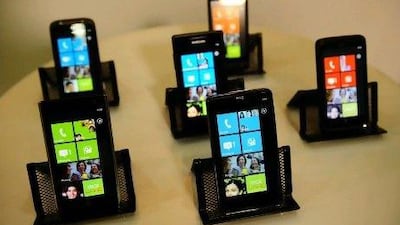Microsoft's launch of its new Windows Phone software has triggered a fierce battle for market share in the Middle East and Africa.
Video: Tech Talk
Neil Parmar interviews the Lenovo GM on the tablet and PC market .
Microsoft predicts that devices using its new operating system will be the most popular in the Middle East and Africa by 2015, even if Google holds on to its lead globally.
Google's market-leading Android system is predicted to expand its worldwide market share to 43.8 per cent in 2015 from 38.9 per cent today, according to the research company IDC.
Mobiles running the Windows Phone system - the latest version is known as Mango - are forecast to have 20.3 per cent of the global smartphone market by 2015, up from 3.8 per cent this year. Despite being second in the global market, Microsoft expects to buck the trend in the Middle East and Africa.
"I think in the Middle East and Africa it should be number one," said Gustavo Fuchs, the director of mobility for Microsoft in the Middle East and Africa.
"IDC predicts globally [that Windows Phone will reach] number two. I think in this region we have the chance to perform better," he added.
Electronics manufacturers including Samsung, LG, HTC and Dell were the first to sign up to make devices running the Windows Phone platform.
However, a deal struck between Microsoft and Nokia will be integral in boosting Windows Phone adoption in this market, said Mr Fuchs.
"This region, if you compare it worldwide, is where Nokia has the biggest market share," he said. "It becomes natural that Windows Phones will have bigger [share]."
Commentators were sceptical that Microsoft would be able to overtake Google's Android system in the Middle East and Africa.
"Microsoft's forecast is over-optimistic, I believe. We are forecasting that Android will be the leading smartphone operating system in the Middle East and globally in 2016," said Matthew Reed, a senior analyst for the Middle East and Africa at Informa Telecoms & Media.
Mr Reed said the Windows Phone will be the second most popular operating system in the Middle East by 2016. He added that the deal between Nokia and Microsoft should not be overplayed.
"Microsoft's tie-up with Nokia should give it momentum, but not all Nokia handsets will use Windows," said Mr Reed.
"Lower-end Nokia devices will probably use a different [operating system]."
Philip Brazeau, who heads the telecoms practice at the Middle East law firm Al Tamimi, also doubted that Windows Phone could become the number one platform by 2015. "It is a pretty brave assertion, given the competition in the space," he said.
Mr Fuchs said Microsoft hoped to boost the Arabic-language support available for the mango version of the Windows Phone system.
"We are talking about Arabic apps for SMS, Web, search, email, Twitter, Facebook. Those applications are already in the marketplace. What we are working with manufacturers now is to make sure that they ship on the phone," he said.
"Longer-term, we are working to make sure that all the functionalities on the phone are Arabic-enabled. I don't have a date, but it is something that is high on our agenda."

